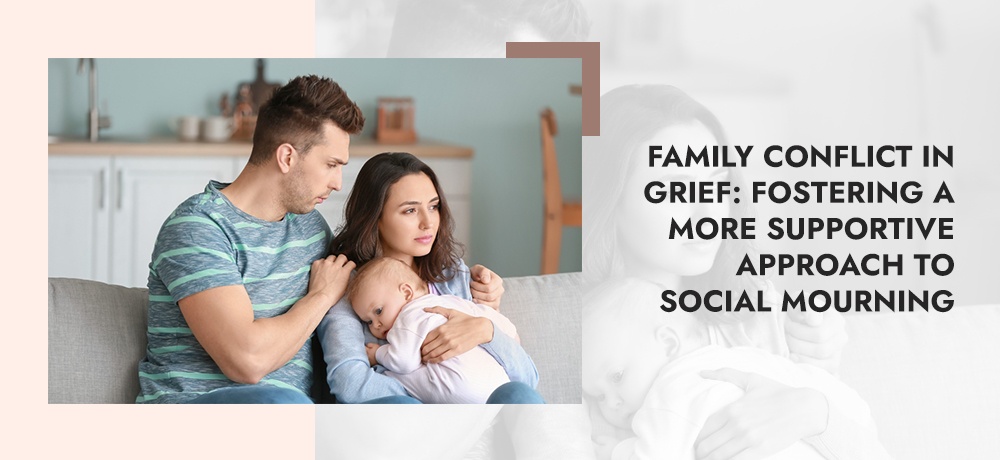
Family Conflict in Grief: Fostering a More Supportive Approach to Social Mourning
- Allius Counselling and Family Mediation Services
I underwent a profound loss in my extended family—a family matriarch who held a special place in our hearts. This period proved to be extremely challenging, as emotions ran high among all of us. I soon came to realize that the grief process I had studied during my clinical counselling training was heavily focused on the individual experience of grief and loss, with little consideration for the broader social context of grieving.
It became evident that the loss of our esteemed elder unfolded within the backdrop of a family and cultural setting that was being tested and compelled to transform in response to this tragic event. Family dynamics and relationships took on a heightened significance, and behaviors that were typically manageable became overwhelming.
Upon reflection, I recognized that this was a common occurrence for many individuals facing a significant family loss. Similar stories had been recounted to me by clients and friends, where enduring fractures emerged within their families after a loss. Family members who had traditionally been pillars of support for each other were now sources of stress when that support was needed the most. It led me to contemplate how we could approach this differently—how we could navigate this sorrowful and challenging period united rather than divided.
Creating a Social Context for Grief
Common grief literature outlines "stages" or a "process," implying a standardized sequence for adapting to a significant loss. In reality, there are diverse ways in which individuals and families navigate the emotional landscape of grief. Certain non-Western cultures adopt a more collective approach to grieving, focusing less on an individual journey. Research suggests that a communal approach tends to foster healthier grief resolution. Prolonged social isolation or avoidance of pain can contribute to unhealthy functioning.
We seem to have adopted a skewed Westernized perspective that establishes a hierarchical ranking of grief entitlement based on who might have been most impacted by the loss. Those who are "less affected" are often relegated to supportive roles for those deemed most affected. For example, a child coping with the death of a parent might be considered the principal affected party, whereas a nephew could be seen as secondary, regardless of the actual relational attachment to the deceased.
This hierarchical approach to emotional expression underestimates the complexity of the relationships with the departed. Making such comparisons restricts healthy mourning, as individuals may feel judged for not meeting "socially accepted" expectations. These judgments distance us from our grief precisely when connection is most needed.
Discovering Resilience through Shared Experiences
Resilience following a death can emerge through our shared reminiscences of our loved ones and by tapping into our inner wisdom and empathy. While I comprehended the significance of my personal relationship with her, I didn't fully grasp the extent to which she had touched the lives of others in equally meaningful ways. It was through these narratives of others' interactions with my family members that I came to more deeply value each person's right to mourn that personal and intimate bond.
A More Constructive Approach to Social Mourning
1. Embrace Diverse Grief Responses: Recognize that each individual's grief experience is unique, leading to varying emotional expressions. Avoid setting rigid expectations for what is deemed appropriate or inappropriate without causing offense. Some people resort to anger or distraction as coping mechanisms until they are ready to confront the reality of the loss. Not everyone's ability to confront pain is the same. Forgiveness plays a crucial role in family grief.
2. Challenge Conventional Family Dynamics: Strive to be conscious of your role in common patterns and triggers within your family's response. Be authentic and allow yourself to be vulnerable enough to communicate your needs and how you are impacted. Sometimes, a loss enables us to shed social facades and get closer to our genuine selves. Remember, others loved that person, too.
3. Respect Others' Limits: Not everyone possesses ample experience with death or crisis, nor do they feel at ease enough to share their pain. Even if someone appears to be handling the loss well or has ceased mourning, don't assume this is the case. Remember that everyone is doing their best within their own limited capacity.
4. Evolution of Relationships After Loss: As we redefine our identities and seek a new "normal," relationships that were once pivotal may lose their significance. New connections will form through the support offered, while others may fade due to lack of support. Release resentment and disappointment concerning shifting relationships, and appreciate the new individuals you encounter along the way.
In Unity through Grief,
Lurline Raposo, MA, RCC-ACS, BCRPT-S
Lurline Raposo Counselling and Family Therapy
Website: www.allius.ca
